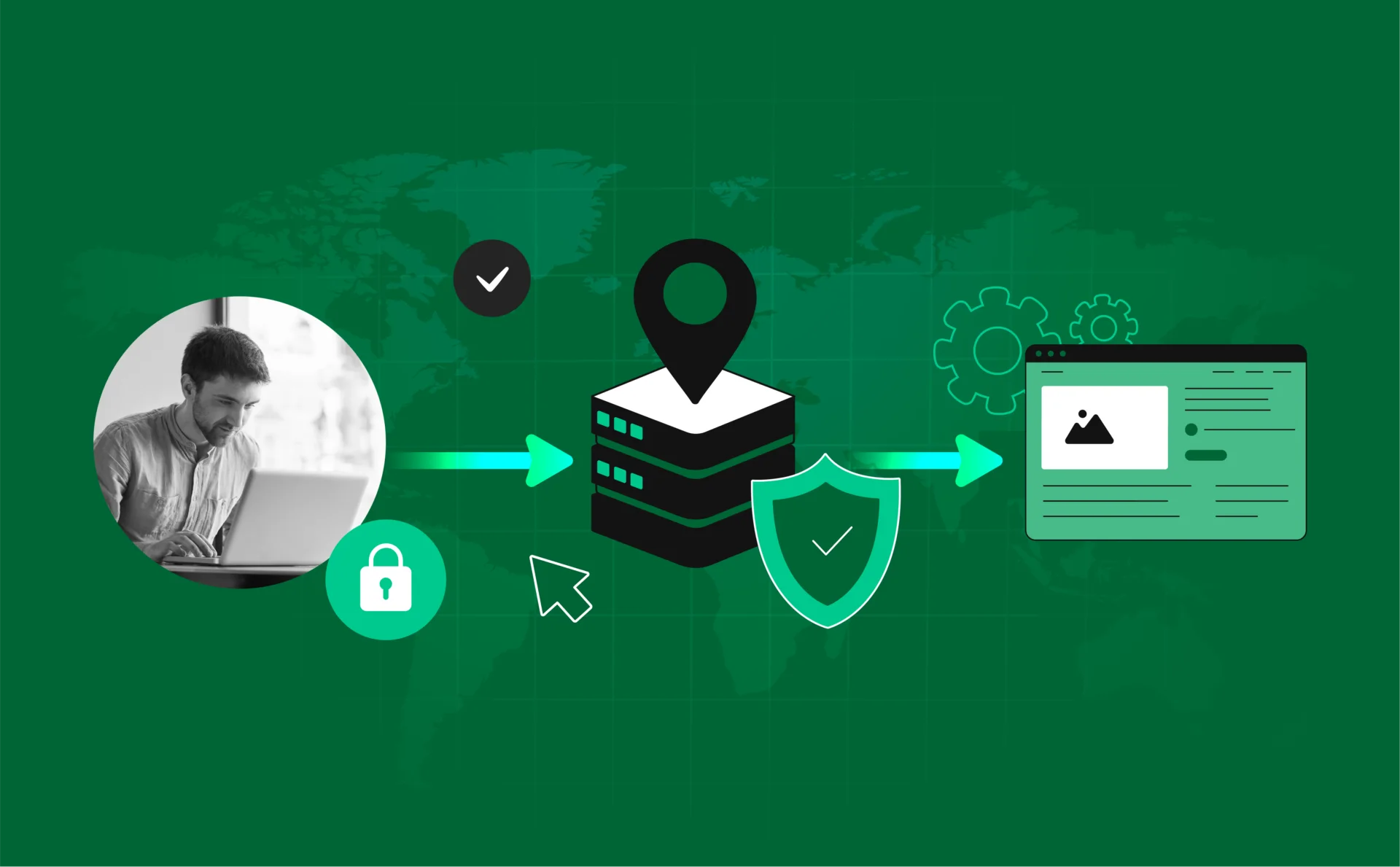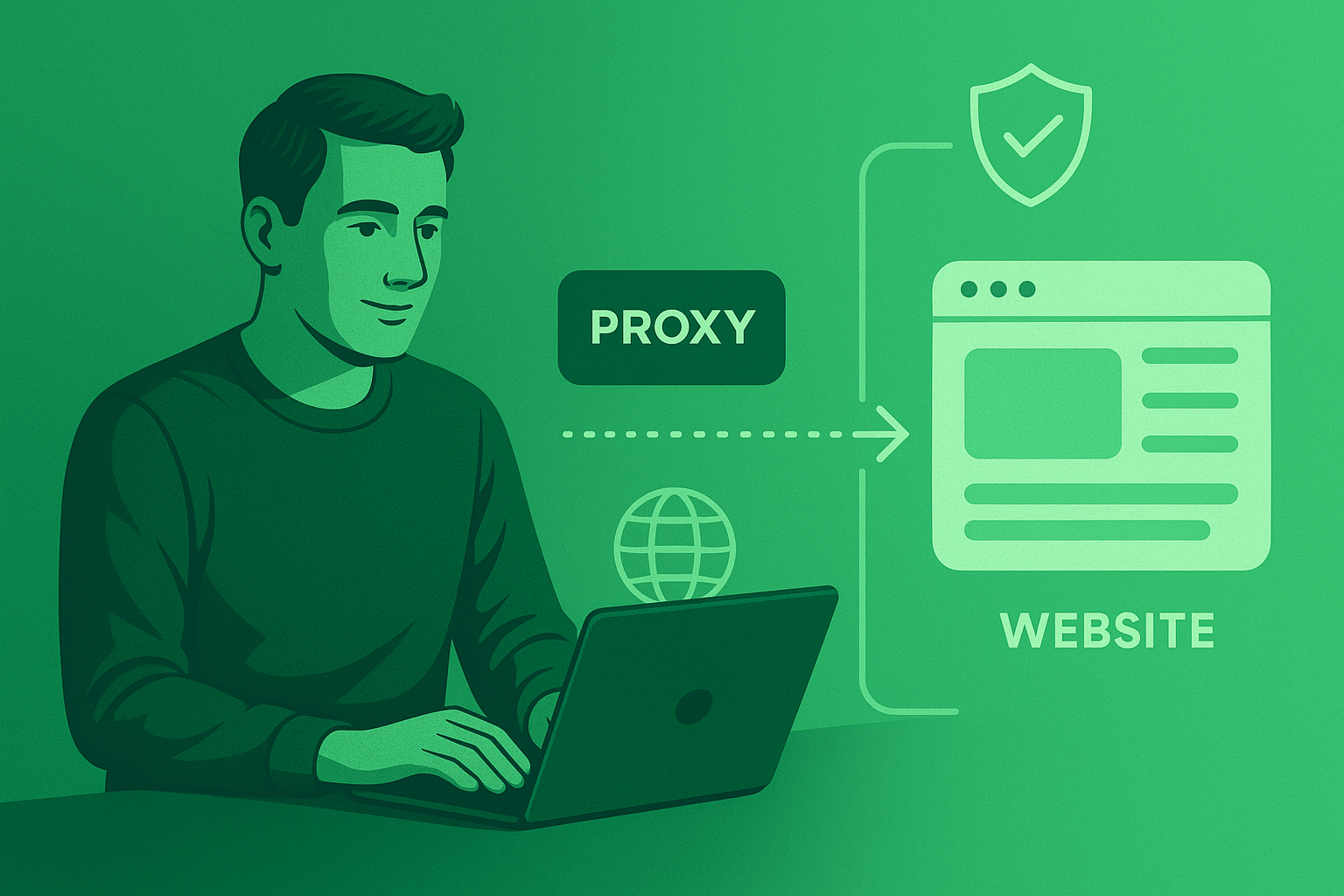
What Is a Proxy Service? Types, Features, and Use Cases
A proxy service is a tool that sits between you and the internet. Instead of your device connecting to a website directly, the proxy connects to the website on your behalf. This hides your actual IP address and replaces it with a different one. The result? More privacy, more control, and sometimes, better access to the content you need.
People use proxy services for various reasons, including browsing privately, accessing region-locked websites, managing multiple accounts, or running web automation tasks such as scraping or ad verification. If you’re running a business, proxies can help you do things at scale without getting blocked. If you’re just browsing, they add a layer of privacy you might not get otherwise.
In this guide, we explain what is a proxy service, how it works, the types you can choose from, and the most common ways people use them today.
What Is a Proxy Service?
A proxy service lets you connect to the internet using a different IP address than your own. When you visit a website through a proxy, the site sees the proxy’s IP, not yours. That means you stay hidden, and your real location stays private.
It’s like asking someone else to knock on a door for you instead of doing it yourself. The website answers, but it only sees the person you sent, not you.
Proxy services are important because they help you stay anonymous, avoid tracking, and access content that might be blocked in your country. It also helps with tasks like running multiple accounts or collecting data without getting blocked.
Proxy services are used by both everyday users and businesses. Whether you want more privacy or need reliable tools to manage your work online, proxies give you more control over how you connect to the internet.
Proxy Servers and Network Security
A proxy server can help protect your network by acting as a barrier between your devices and the internet. When you use a proxy, websites don’t talk to your computer directly—they talk to the proxy. This hides your real IP address and gives you more control over what traffic comes in and out.
For personal use, proxies can block shady websites or filter out unwanted content. For businesses, they help manage what employees can access online, protect internal systems from outside threats, and reduce bandwidth by caching content. Some proxies also scan traffic for malware before it reaches your device.
While a proxy isn’t a full security solution, it’s a useful tool when combined with things like firewalls and antivirus software. It adds a layer of protection that keeps your network more private and harder to attack.
How a Proxy Works?

When you connect to a proxy, it steps in between you and the websites you visit. You send your request, the proxy passes it along, then sends the website’s response back to you. The website sees the proxy’s IP, not yours. That’s how it keeps your real IP hidden.
There are two common ways proxies work: some are hardware devices that sit inside your network, others are cloud-based services you connect to through software. Most people use the software kind—you set it up by entering the proxy’s IP address and port into your device or browser settings. Some providers offer tools that handle this for you.
Free proxies do exist, but they’re often limited in speed and reliability. Paid services usually give you more locations, better uptime, and support for multiple connections. If you’re using proxies for anything serious—like managing accounts or gathering data—reliability matters.
How a Proxy Protects Your Privacy and Data?
A proxy helps protect your computer by hiding your real IP address. When you go online through a proxy, websites and trackers only see the proxy’s IP—not yours. This makes it harder for anyone to trace your activity back to you or try to target your device directly.
Many proxies also act as filters. They can block unwanted traffic, scan for suspicious activity, or follow rules set by the user or network admin. This reduces the chances of malware reaching your system or of sensitive data being exposed.
If you’re using a proxy with encryption, it adds another layer of protection. Your login details, personal info, and other private data are harder to intercept. This is especially useful when using public Wi-Fi or accessing work systems remotely. With the right setup, a proxy gives you more privacy and a safer connection without changing how you browse.
Proxy Server Use Cases
Proxy servers are used for far more than just hiding your IP. Whether you’re browsing privately, running a business, or automating tasks, proxies give you control, speed, and access that would otherwise be out of reach. Here’s how people and companies use them in the real world:
1. Keep Your Browsing Private
When you use a proxy, websites can’t see your real IP address. This helps you avoid tracking by ad networks, search engines, and other third parties. You stay anonymous, and your browsing history stays your own.
2. Access Content from Other Countries
If a site or service is blocked in your country, a proxy lets you view it by routing your connection through a different location. This is common for streaming platforms, news websites, or online tools with regional limits.
3. Collect Data Without Getting Blocked
Businesses use proxies to gather public data—like prices, reviews, or search results—at scale. With rotating IPs, they can scrape websites without triggering blocks or CAPTCHAs.
4. Check Your Ads from Different Regions
If you run ads, you need to see what they look like in different countries. Proxies help you view your campaigns the same way users in those places would, so you can catch mistakes and prevent fraud.
5. Run Multiple Accounts Without Risk
Platforms like social media or e-commerce often flag users running many accounts. With proxies, you can assign each account a unique IP address, keeping them separate and reducing the chance of bans.
6. Bypass CAPTCHAs and Anti-Bot Systems
Rotating residential or mobile proxies help you avoid blocks when doing tasks like web scraping, automated testing, or buying tickets online. They make your traffic look like it’s coming from real users.
7. Control Internet Use in the Workplace
Companies often use proxies to block distracting or harmful websites. They can also track internet use, filter content, and keep traffic logs to stay in line with internal policies or local laws.
8. Save Bandwidth and Speed Up Access
Proxies can store copies of frequently visited pages. When someone requests the same content again, the proxy delivers it instantly without fetching it again from the web. This reduces load times and cuts down data use.
9. Target Ads and Content by Location
With proxies in different cities or countries, you can test ads, analyze local search results, and run geo-targeted campaigns. This helps you market smarter and reach the right audience.
10. Follow Data Laws Like GDPR
Some businesses use proxies to restrict access to certain data based on location or to mask user identities. This helps them meet legal requirements and protect user privacy.
11. Buy High-Demand Items
For things like concert tickets or limited-release products, proxies can help you make multiple purchases from the same site without getting blocked. Each IP looks like a different person, giving you more chances to buy.
Different Types of Proxy Servers
Not all proxies work the same way. Some focus on privacy, others on speed or control. The type you choose depends on what you need—whether that’s staying anonymous, managing traffic, or getting around blocks. Here are the most common types and what they’re used for:
- Forward Proxy – Sits between you and the internet. It hides your IP and helps with private browsing, geo-unblocking, or running multiple accounts.
- Reverse Proxy – Placed in front of a website or server. It handles incoming requests, adds security, and can balance traffic across servers.
- Anonymous Proxy – Hides your real IP but lets websites know you’re using a proxy. It gives some privacy but isn’t fully hidden.
- High Anonymity (Elite) Proxy – Hides both your IP and the fact that you’re using a proxy. This gives you strong privacy and is harder to detect.
- Transparent Proxy – Doesn’t hide your IP or proxy use. Often used in schools, offices, or public Wi-Fi to block or log websites.
- Datacenter Proxy – Comes from servers in data centers. They’re fast and cheap but easier to detect and block.
- Residential Proxy – Uses IPs from real devices like home users. Harder to detect and useful for scraping, ad testing, or anything needing high trust.
FAQ
Can a proxy be traced back to me?
If you’re using a high-anonymity or residential proxy from a trusted provider, it’s difficult to trace your activity back to your real IP. However, poor-quality or misconfigured proxies may leave digital traces that compromise privacy.
Do proxies slow down your internet speed?
Some free or overloaded proxies can cause lag. Paid proxies—especially datacenter or residential ones—usually offer fast speeds and stable connections, especially when located close to your target region.
What’s the difference between a proxy and a VPN?
A proxy hides your IP but doesn’t encrypt your traffic. A VPN hides your IP and encrypts everything between you and the server. Proxies are better for speed and automation; VPNs are better for full data protection.
Are proxies legal to use?
Yes, using a proxy is legal in most countries. However, what you do with a proxy matters. Activities like scraping copyrighted content or bypassing geo-restrictions on restricted services may violate terms of service.
Can I use a proxy on my phone or smart TV?
Yes. Some proxies can be set up on mobile devices or even network routers, which can route traffic for smart TVs, gaming consoles, or entire home networks through a proxy IP.
Conclusion
A proxy service isn’t just a privacy tool—it’s a practical solution for everyday users and businesses alike. Whether you’re trying to hide your IP, collect data without getting blocked, or manage online accounts at scale, proxies help you do it without drawing attention. With the right type of proxy in place, you gain more control over your internet activity, reduce risks, and open the door to content and tools that would otherwise be out of reach. Simple setup, real results.